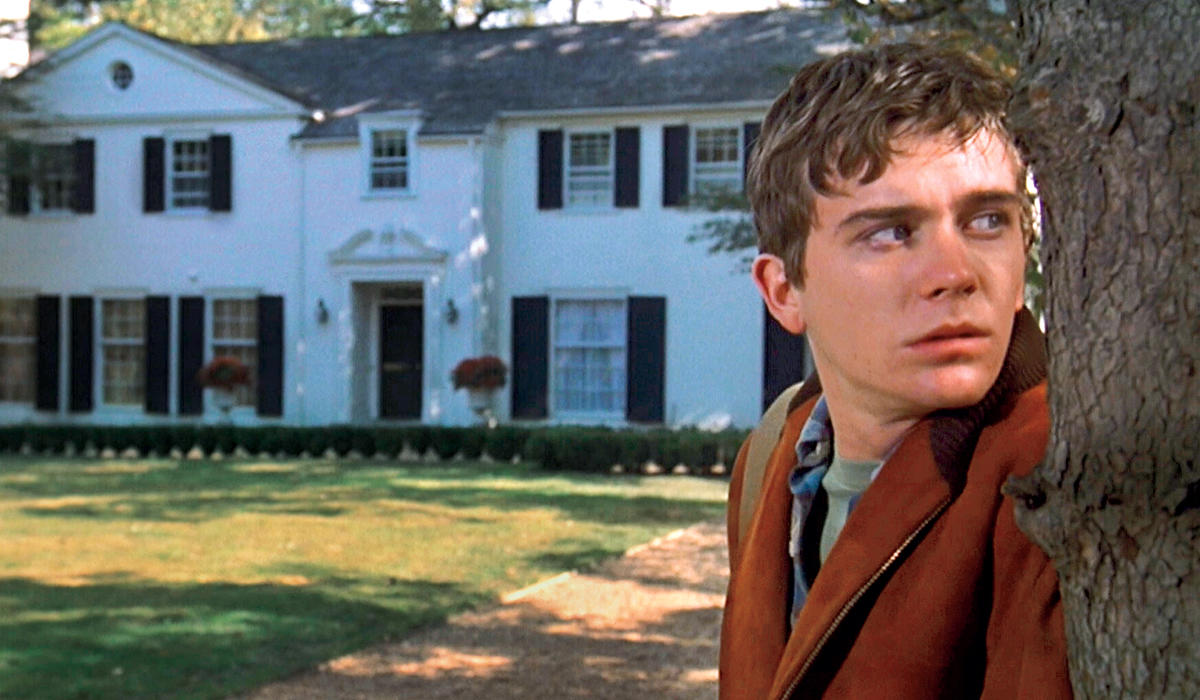
The Untold Story of Ordinary People
In 1981, Robert Redford's directorial debut won big and redefined the family drama. Now, 35 years later, the filmmaker and stars look back on the movie that put an entire generation in therapy.
by SARA VILKOMERSON
The Untold Story of Ordinary People
In 1981, Robert Redford's directorial debut won big and redefined the family drama. Now, 35 years later, the filmmaker and stars look back on the movie that put an entire generation in therapy.
by SARA VILKOMERSON
The 53rd Academy Awards were unusual before they even began. Originally scheduled for March 30, 1981, they were postponed a day because of the attempted assassination of President Ronald Reagan. But, as host Johnny Carson noted, the show did go on, and the big winner was Ordinary People, beating out Coal Miner's Daughter, The Elephant Man, Raging Bull, and Tess for Best Picture and taking home trophies for first-time director Robert Redford, screenwriter Alvin Sargent, and Best Supporting Actor Timothy Hutton.
Adapted from Judith Guest's 1976 novel, Ordinary People is an elegantly restrained drama about the Jarrett family, shattered by tragedy after an accident leaves their elder son dead and their surviving son crippled by grief. Mary Tyler Moore and Donald Sutherland starred as parents who once seemed to have it all, and Hutton, in his first major film role, broke America's collective heart as Conrad, the son left behind. Judd Hirsch costarred as the therapist who helps him, and a young Elizabeth McGovern played Conrad's love interest.
NO ORDINARY STAR
In the 1970s, few actors had more clout than Robert Redford. But by his early 40s he was seeking a new challenge.
ROBERT REDFORD: [Director] I was producing things I was acting in, but I had never directed and I felt it was time. I was looking for a piece of material that was about behavior and feelings. When I read Judith Guest's book, I thought, This is it.
Judith Guest: [Author] Ordinary People was my first book, and I was just thrilled that Viking was going to publish it. Then Redford called one day. I have a couple of brothers who are a bunch of jokesters, so when I got this call saying, "Hi, Judy, this is Robert Redford," I said, "Yeah, sure it is." I'm sure he gets that all the time. He just said, calmly, "No, it really is."
REDFORD: At that time I had a place in Malibu, and it was winter and I was sitting there looking out on the beach. I saw this lonely figure all wrapped up and walking slowly. The figure looked sad. On closer examination I saw it was Mary Tyler Moore—America's sweetheart. She was probably just cold, but the sadness hit me and stuck with me when I began casting. I went to see Mary and her [then] husband, Grant Tinker.
Mary Tyler Moore: [Beth Jarrett] Redford was warm and funny and very charming. He told me I was the one whose face he saw as he read the book. Beth was the character he said he most cared about, and he wanted her portrayed with sensitivity. And he wanted me. This was Robert Redford. How could I say no?
REDFORD: She had only done these bright, happy things, so I felt pretty awkward going in there and suggesting she play a darker character. But she was very excited and wanted to do it.
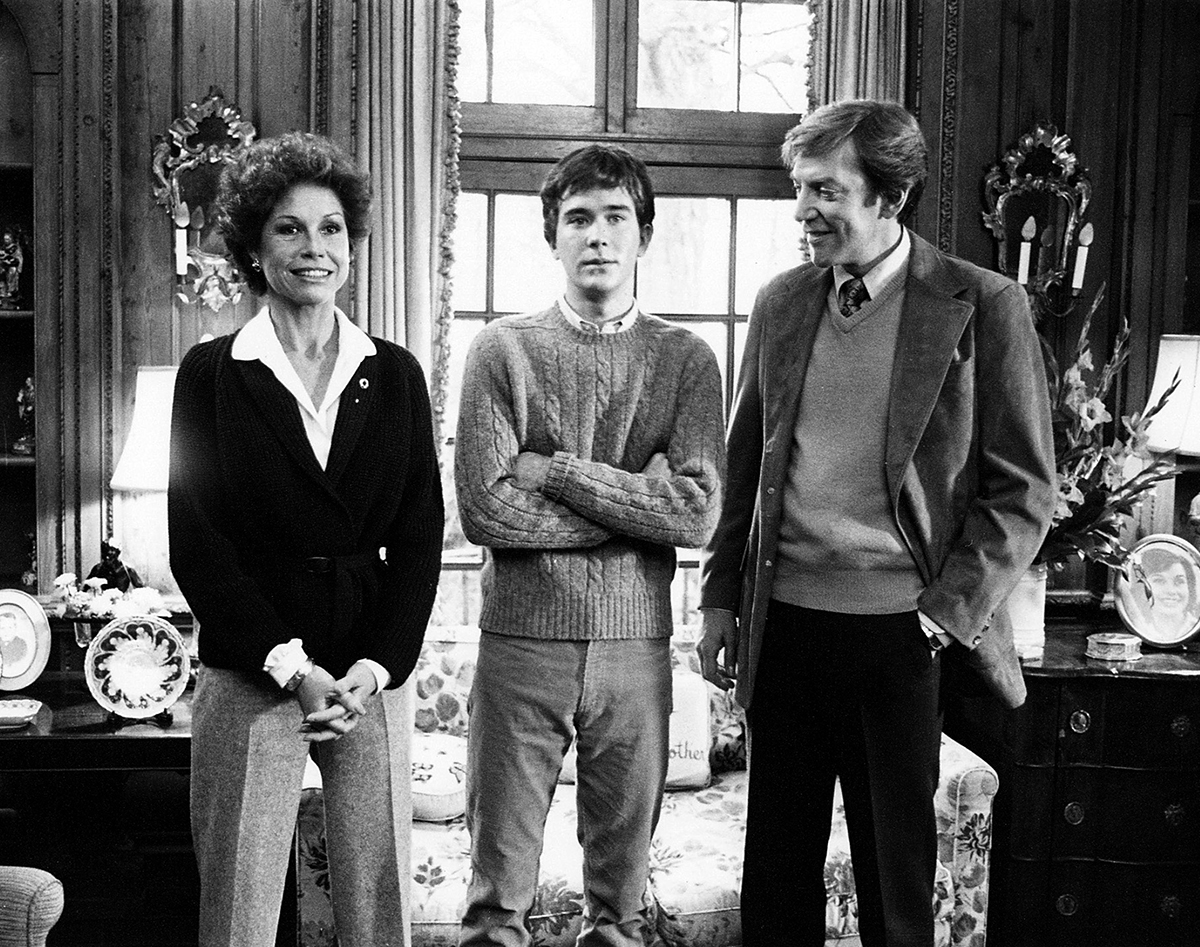
Moore, Hutton and Sutherland on the set of Ordinary People.Everett Collection
MOORE: I think, like all actors, I was open to taking on new challenges, including those outside my comfort zone. But this was not why I took the role. The appeal was the powerful story with its vivid characterizations—including a family dynamic I could relate to. Again, I note, it was Robert Redford!
REDFORD: I thought Richard Dreyfuss should play the psychiatrist, so I called him and asked. He said, "I can't talk right now, I'm having a nervous breakdown." So I said, "Well, I won't bother you. Hope it all works out." Then I went to Donald Sutherland. He said, "I don't want to play the psychiatrist, but I'd love to play the husband."
DONALD SUTHERLAND: [Calvin Jarrett] I went into his office—he was seeing me to kind of audition for the part of the psychiatrist. But I wanted to play the father. The marriage reminded me of one that I was familiar with. So [Redford] thought about it, and then he cast me. He said, "It was either you or Gene Hackman."
REDFORD: I saw this TV show, Taxi, that had Judd Hirsch in it, and he had this rapid-fire delivery. I thought, "Wait a minute: This would be great because he seems like he's a little nuts." I thought the psychiatrist should appear a little crazy.
JUDD HIRSCH: [Dr. Berger] I asked if I could read the book, and he sends me the book. I said, "You gonna change the title?" He said no. I said, "Good."
TIMOTHY HUTTON: [Conrad Jarrett] I guess the casting director had seen a TV movie I had done called Friendly Fire with Carol Burnett and Ned Beatty. They had cast a pretty wide net for [Conrad]. There was a total of five or six auditions; the fifth one was with Redford. He was sitting behind a desk and was eating a chicken salad. There was something that made you instantly relax when you were around him. I remember how clear he was as a communicator—not just direct in what he had to say but in pulling things out of you. From the beginning he had a great ability to be very specific and go deeper at all times.
GUEST: He asked my opinion on things. He'd send me drafts of the script with a note: Judy, feel free to wail. I never felt like wailing because I always felt like he was listening to me. I thought Timothy Hutton was perfect, just perfect.
HUTTON: The casting process went on for a while—I didn't know enough then to know that six auditions is quite a lot. Redford asked me to come down for this screen test. I walked on the stage, and it was Ann-Margret [as Beth].
REDFORD: Elizabeth McGovern was about to go to Juilliard and so was going to turn [the film] down. I said, "Can you just hold on for a couple of weeks?"
ELIZABETH MCGOVERN: [Jeannine Pratt] I was just this young kid, and his attitude was "Life is as important as the movies," and he was right. In retrospect, I see what an unusual man he is and what an unusual situation it was.
HUTTON: I think he was considering Marie Osmond if Liz McGovern couldn't do it.
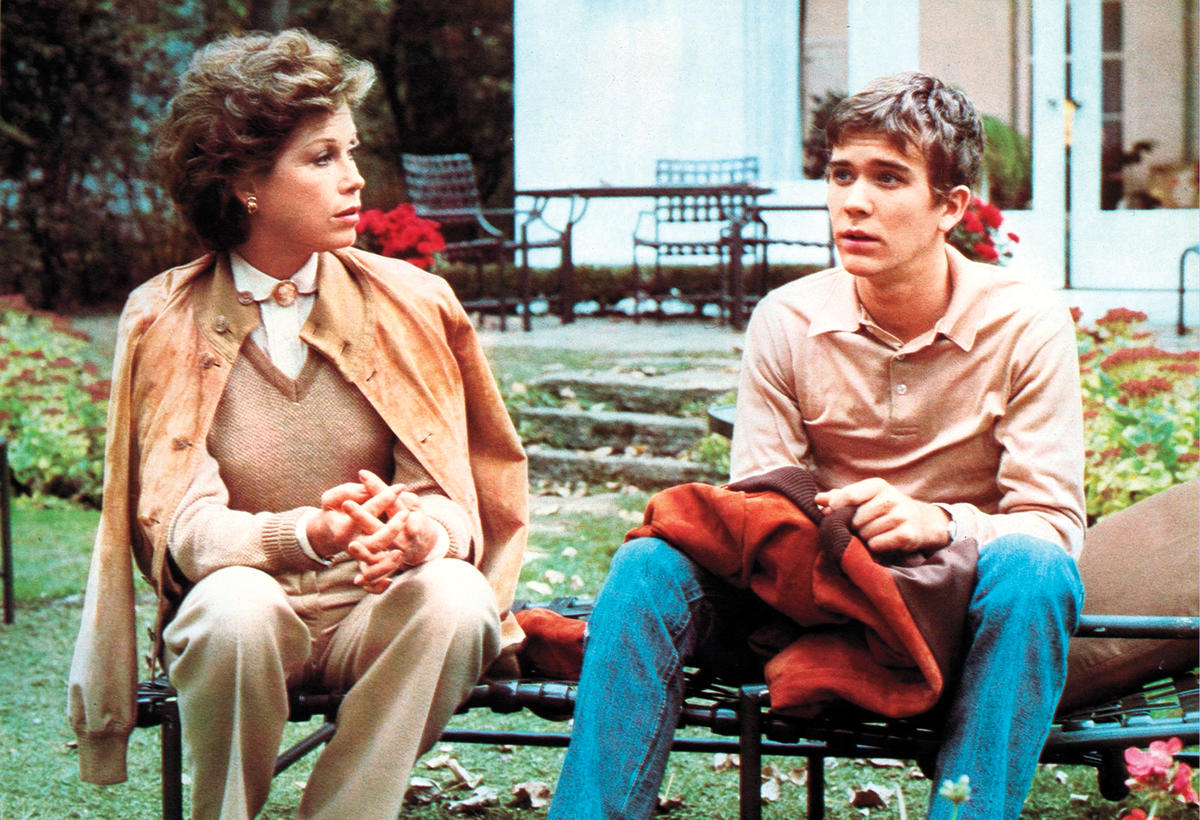
Mary Tyler Moore and Timothy Hutton in a film still from Ordinary People.Mary Evans/Ronald Grant/Everett Collection
STUDIO REJECTION
REDFORD:At that particular time there was no interest in the film. I’d gone to a couple of studios and they were not interested. They thought it was decidedly uncommercial. Also, the lead character was a woman who appeared dark and negative—they didn’t want to have anything to do with that. Especially because it was going to be Mary Tyler Moore. No studio wanted it.
Barry Diller: [Paramount Pictures] I haven’t the vaguest idea why [other studios passed]. I’ve never cared what anyone else thought.
REDFORD: Barry Diller was the head of Paramount at the time. The people under him were Michael Eisner and Jeffrey Katzenberg and they didn’t like it at all. Yet Diller, who was above them, was. That surprised me. He said, go ahead and do it.
DILLER: It was a great script. It really wasn’t hard once Redford—who, by the way, in addition to everything else, is a great salesman—once Redford said he wanted to direct it, it was yes, of course.
REDFORD: He said, go away and make it we won’t bother you. That was the big gift that I got—the support of Barry Diller to make this film.
SOLITARY CONFINEMENT
Filming took place in the fall/winter of 1979–80 on Chicago's North Shore. Redford instructed cast and crew to not interact with Hutton on or off the set.
REDFORD: I wanted him to feel isolated. It would be up to him what to do with it, but I didn't want him to feel like he had a lot of support because the character didn't. He was wonderful. It was a brand-new thing for him, and he was raw and totally open.
HUTTON: It was tough. I didn't know what was going on. If I had been aware of the strategy, it would have been easier for me, but it would have defeated the brilliant purpose Redford had in mind, which was to keep me off balance.
MOORE: I remember most that Tim was young, and yet so, so good. Very mature for his years.
HUTTON: I think the most [Moore] ever said to me was on the first or second day. I remember going to the craft-services table and saying, "Good morning." Her back was to me. Without turning around she just said, very quietly, "Hello." Then she got her coffee and walked away. [Laughs] Having said that, she is one of the loveliest people I've ever met. She was staying in character.
SUTHERLAND: I don't remember spending any time with anybody on set. I don't spend a lot of time with people.
HIRSCH: The only person I hung out with was Timothy. He was so young and green and had just lost his father [the actor Jim Hutton] a few months earlier.
HUTTON: Judd and I would sit in the coffee shop and talk. It was great because during the scenes, the way I related to him was as someone incredibly familiar.
HIRSCH: There was something so genuine about Tim. I had read the book and thought, "This innocent guy is just like him!"
HUTTON: The whole thing was very intense. I remember being in my hotel room, and I would pace back and forth, thinking, "I don't know how I'm doing. I don't know if I'm getting it right." I kept a journal, and I wrote every day. Years later I read it, and it really did read like Conrad.
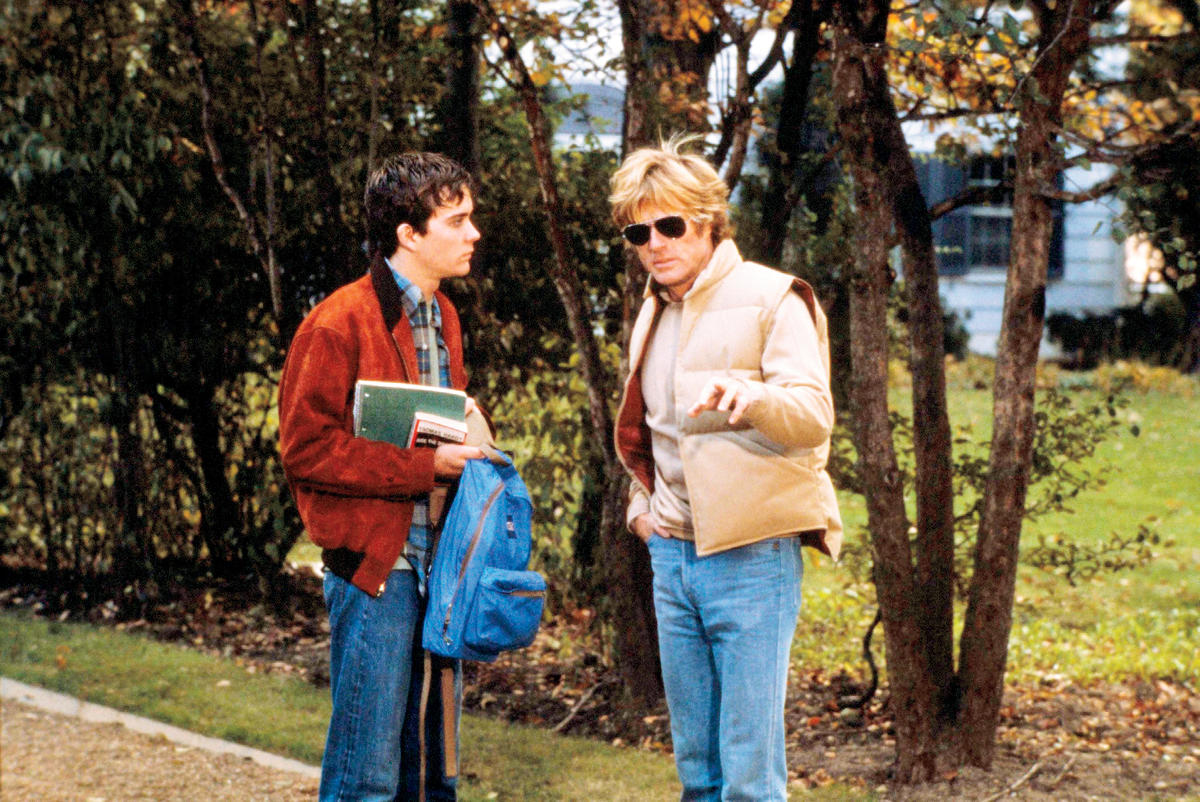
Director Robert Redford and Timothy Hutton on set. Paramount/courtesy Everett Collection
PARENT TRAP
As Conrad begins to heal, the cracks in Beth and Calvin's marriage become impossible for Calvin to ignore—in particular, Beth's inability to show Conrad affection. Audiences viewed Beth as the ultimate icy mother, but Moore never saw her that way.
MOORE: Beth was a victim. I shared this with Redford, who told me in our first meeting that the nonrelationship Beth had with Conrad was the mirror of the noninteraction he had with his own father. Beth made me think of my father and his rigidity. I imagine a bit of him in me—along with my own tendency to want everything to be perfect—set the table for bringing Beth to life on film.
SUTHERLAND:The first day Bob and I sat together, I had this mustache. I am fundamentally an unattractive person, and the more hair I can get on my face, the better. He said, "Calvin wouldn't have a mustache." I had brought an electric razor in my pocket, so when he went to the john, I just went bzzzzzz.
REDFORD: Donald could do anything. He was going to have a meltdown during the film where it was going to be this great dramatic moment when he has to tell his wife he's not sure he loves her anymore. He told me he was looking forward to it, and I think he got so wired up for it—when the moment came, he really let loose. I felt maybe it was too much. When the film was finished, I felt it was too much. Here's where Donald is great: I said, "Donald, I want you to look at this." We looked at the scene together, and he said, "You're absolutely right. Can I do it again?" So we went back to the location and shot that moment and recut it into the film.
SUTHERLAND: Bless his heart, no. What happened was we were sitting looking at rushes, all of us, and I was humiliated by myself. They were all happy with it. The day after, I said, "Guys, I've really screwed you. I've done the stupid old actor's bulls---thing." Out of context it was well performed, but it was wrong. Three months after we stopped shooting, [Redford] phoned me and said, "I think you were right. Can we do it again?" I said, "Absolutely." Redford stood in for Mary because she wasn't there.
HUTTON: Every step of the way, Redford was incredibly thoughtful toward me. He arranged a screening on the Paramount lot and set it up for me to watch. You don't just see and feel the movie, you see and feel every day you worked on it. I went back to my car, and I just kind of sat in the parking lot for a couple of hours. It connected the line between the guy who was pacing the hotel room, wondering if he was doing okay, to the guy sitting in the car on the Paramount lot, feeling like you did do okay. It wasn't amazing euphoria; it was more like my breathing shifted for the first time since I started working on the movie.
BOUND FOR GOLD
Ordinary People was released on Sept. 19, 1980, and went on to earn $55 million. Heading into the Oscars, it had six nominations, including nods for Hutton, Moore, Hirsch, and Redford, as well as for Best Picture.
HUTTON: Somehow I managed to swing tickets for myself, my mom, and my date, Diane Lane. As we were taking our seats, Judd leaned in to me and said, "Remember, it's enough just to win." [Laughs]
REDFORD: I never dreamed in a million years that it would have the result that it did. I kind of thought it would be buried.
HUTTON: Mine was the first category. I remember Mary Tyler Moore and Jack Lemmon presenting and Mary reading the envelope. She said, "The winner is..." and then she looked at me right before she said my name. She kind of smiled. I got up and stumbled and nearly fell right on Redford. Fortunately, he extended his hand in a way that if he hadn't, I would have definitely had a face-plant. He sort of nodded. It was back to Redford being the director. He nodded toward the stage like, "Go, go!"
REDFORD: [In the final awards of the night, Redford won for directing, and the film scored Best Picture.] That was really weird. I didn't know what to do with that. Really, I was in shock. I did not expect it.
MOORE: I was thrilled for Redford and Tim and for everyone. Best Picture is about the contributions of every one of the people listed in the credits, so while I was personally disappointed that I did not win, having the chance to work with such an extraordinary group was reward enough for me.
THE PAST IS PAST
Ordinary People became a touchstone for a generation, but Redford, Sutherland, and Hutton insist they've never rewatched it.
REDFORD:[Making Ordinary People] was a wonderful experience. Tremendous. I haven't seen it since. It belongs to the public now; it no longer really belongs to me.
SUTHERLAND: I can't watch completed films—my wife makes fun of me—but I've seen pieces of it.
HUTTON: I understand why Redford hasn't seen it. I've never seen it all the way through since that screening Redford had for me. It's like a time capsule. You don't want to go back and open it up. I know the experience of watching it again wouldn't be a negative one, and it's not because I don't have any interest in it. It might just mess me up for a couple of days. It's a certain point of a person's life where things are more raw than perhaps they've ever been. That stuff comes rushing back.
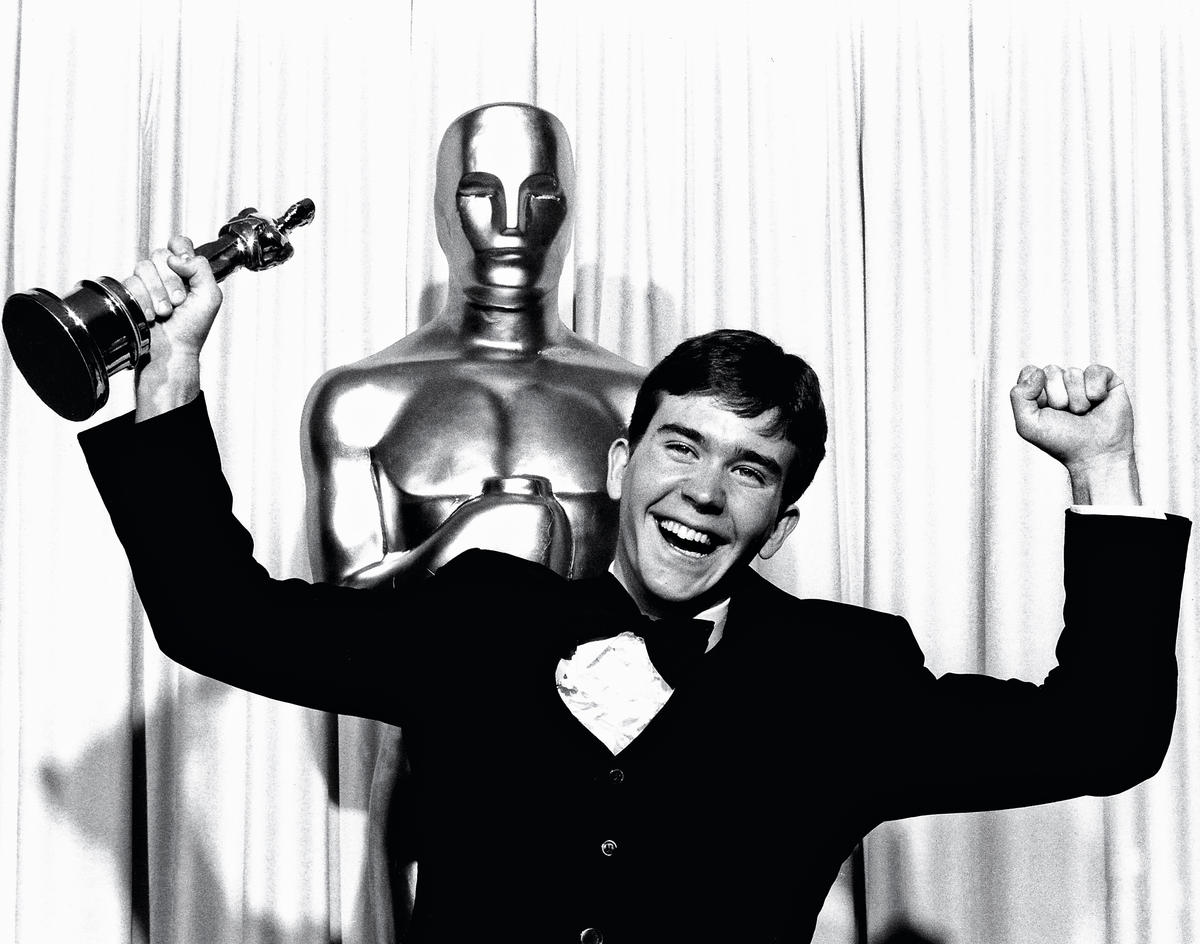
Timothy Hutton with his Academy Award for Ordinary People, 1981.Everett Collection
